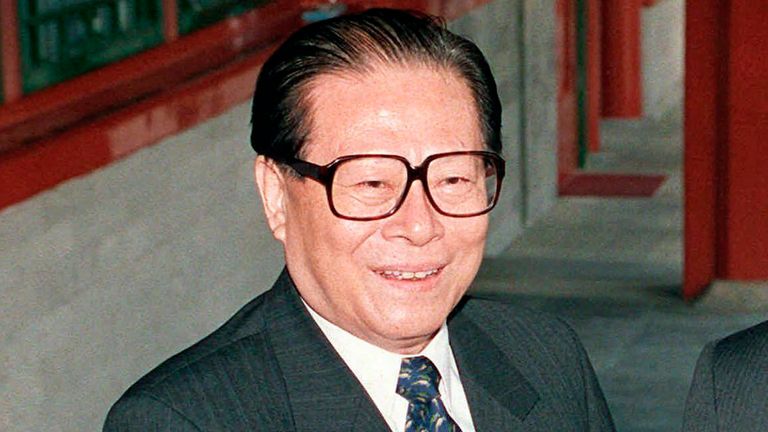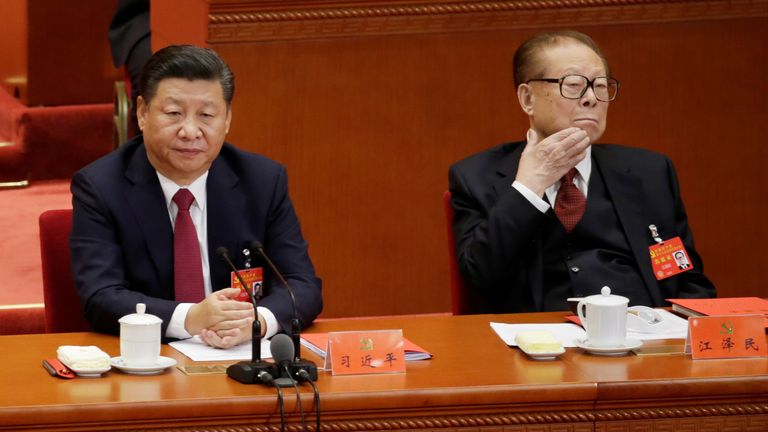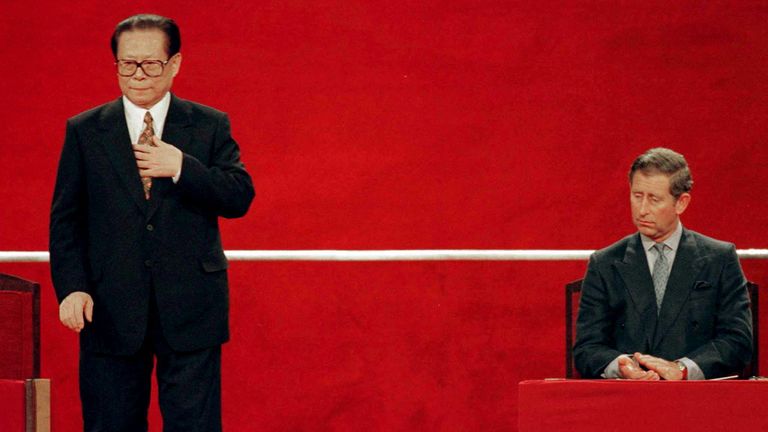Jiang Zemin: Former Chinese president who came to power after Tiananmen Square protests dies aged 96
Mr Jiang came to power after the 1989 Tiananmen Square protests and saw the return of Hong Kong to China following the British handover. While the country was led out of isolation under his government, Mr Jiang continued to crack down on dissent at home.
Wednesday 30 November 2022 16:56, UK
The former Chinese president Jiang Zemin, who came to power after the 1989 Tiananmen Square protests, has died aged 96.
Mr Jiang was made general secretary of the Chinese Communist Party in 1989 and went on to serve as president between 1993 and 2003.
He had been on the verge of retirement as Shanghai party leader when he was handpicked to be general secretary by China's then-paramount leader Deng Xiaoping.
Mr Jiang succeeded Zhao Ziyang, who was dismissed by Mr Deng due to his sympathy for the student-led Tiananmen Square protests that were crushed by China's army.
Mr Jiang died from leukaemia and multiple organ failure in Shanghai on Wednesday afternoon, state media has reported.
The former soap factory manager stepped down as party chief in 2002, but remained head of the military for another year and remained an influential figure in Chinese politics.
His death comes as China faces widespread anti-lockdown protests across the country on a level of dissent likened to the pro-democracy movement centred on Beijing's Tiananmen Square in 1989.
In 13 years as party general secretary, China's most powerful post, Mr Jiang guided the country's rise to economic power by welcoming capitalists into the ruling party and pulling in foreign investment.
It led to a decade of explosive growth with China passing Germany and then Japan to become the second-largest economy after the United States.
The country weathered the 1997-1998 Asian financial crisis and pulled in foreign investment after joining the World Trade Organisation in 2001 following 12 years of negotiations. Mr Jiang also secured the bid to host the 2008 Summer Olympics in Beijing.
In 1997, he saw Hong Kong return to China after more than 150 years of British rule.
'A beloved comrade'
A letter to the Chinese people by the ruling Communist Party and government officials announcing Mr Jiang's death, described it as an "incalculable loss".
It read: "Comrade Jiang Zemin's death is an incalculable loss to our Party and our military and our people of all ethnic groups".
It called him a "beloved comrade", an outstanding leader of high prestige and a great Marxist.
Crackdown on dissent at home
Although China was led out of isolation under Mr Jiang's government, a crackdown on dissent at home continued.
His successors have used his phrase "stability above all else" to justify intensive social controls.
Human rights and pro-democracy activists were jailed and a ban was placed on the meditation group Falun Gong, which was viewed as a threat to the ruling party's power.
Read more:
Tensions in Shanghai remain 'very, very high'
China protests could 'crack' Xi's dominance
Mr Jiang also attempted to strengthen political ties outside China and travelled to the US to meet the then US President Bill Clinton in 1997.
He was also one of the few world leaders to meet former US President George W Bush at his ranch in Crawford, Texas in 2002.
Portly and owlish in oversize glasses, Mr Jiang was an ebullient figure who played the piano and enjoyed singing, in contrast to his more reserved successors.
Click to subscribe to the Sky News Daily wherever you get your podcasts
On a visit to Britain, he tried to coax Queen Elizabeth II into singing karaoke.
Mr Jiang was last seen in public in October 2019 among other former leaders watching a military parade at Tiananmen Square.
In 2022, he handed his post as party leader to Hu Jintao who was seen being unexpectedly escorted out of a closing ceremony of the ruling Communist Party last month.
Mr Jiang was born on 17 August 1926 in the affluent eastern city of Yangzhou.




